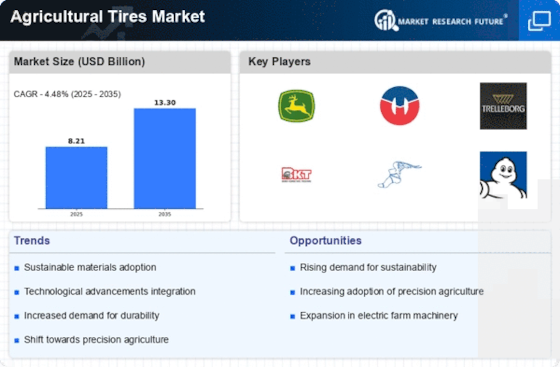Market Analysis
In-depth Analysis of Agricultural Tires Market Industry Landscape
In recent years, there has been significant progress in the development of technologies such as artificial intelligence (AI) and machine learning. These advancements are not limited to high-tech industries; they have also found applications in unexpected sectors, such as agriculture. Tractor manufacturers are now providing cutting-edge software and equipment that allow users to analyze data, marking a crucial shift in the way farming is approached.
Agriculture plays a pivotal role in shaping the Gross Domestic Products (GDPs) of nations worldwide. Recognizing its importance, government bodies are increasingly advocating for the integration of AI and machine learning technologies in the agricultural sector. The primary goal is to enhance productivity and efficiency, addressing the challenges faced by farmers.
In the context of India, where a substantial 55% of the population is engaged in agriculture, the adoption of AI and machine learning holds immense potential. Projections suggest that incorporating these technologies could contribute an additional USD 2 to USD 3 trillion to the global GDP over the next decade. This potential windfall isn't just about economic numbers; it translates to increased productivity and higher revenues for farmers, positively impacting their livelihoods.
Furthermore, the adoption of AI and machine learning in Indian agriculture is anticipated to reduce reliance on agricultural imports while simultaneously boosting exports. This shift not only aligns with economic objectives but also contributes to the country's self-sufficiency in food production.
Smart farming techniques, empowered by AI and machine learning, are poised to revolutionize the global agricultural sector. The impact is expected to be particularly profound in developing countries, where these technological solutions may be introduced to the sector for the first time. The implications are vast, ranging from optimized resource utilization to more precise crop management.
The transformative effect of smart farming is not limited to local contexts; it has global repercussions. Forecasts suggest that the adoption of these innovative techniques will fuel the growth of the global agricultural tractors market in the coming years. This market expansion is not merely a reflection of technological trends; it symbolizes a fundamental shift in the way agriculture is practiced and managed worldwide.
In conclusion, the integration of artificial intelligence and machine learning technologies in agriculture represents a watershed moment. The potential economic gains, especially in a country like India with a significant agricultural workforce, underscore the transformative power of these innovations. As smart farming becomes more prevalent, its influence on global agriculture is poised to reshape traditional practices, ushering in an era of heightened efficiency, productivity, and sustainability.


















Leave a Comment